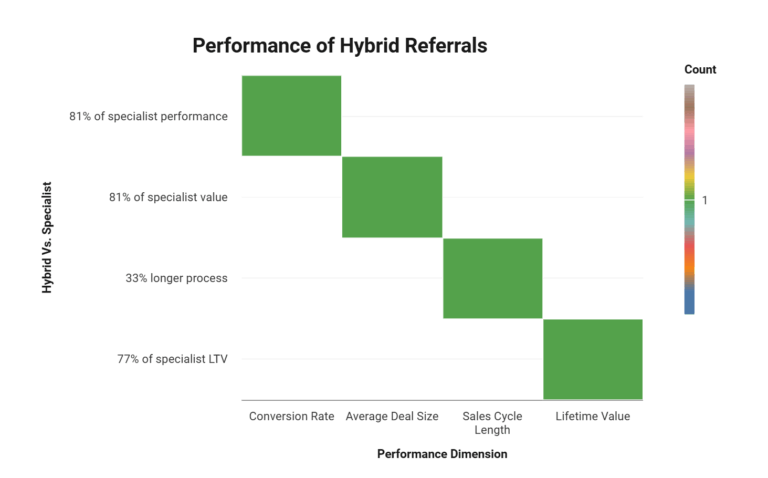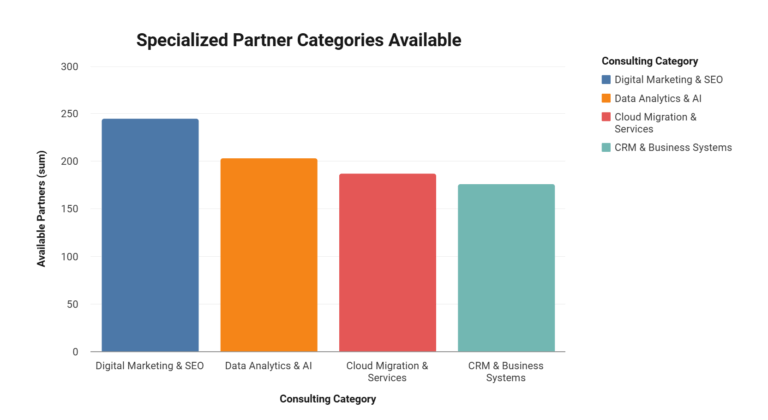Digital Transformation’s Impact on Consulting Referral Patterns & Data
digital transformation referral patterns data
The digital disruption of traditional referral networks has triggered a 15% decline in word-of-mouth recommendations while digital search methods have surged by 11%, forcing consulting firms to reimagine client acquisition strategies through AI-powered matching, digital platforms, and content partnerships. The consulting industry is experiencing a fundamental shift in how client relationships originate and develop. According to Mooncamp's December 2024 Digital Transformation Statistics report, 63% of organizations have seen improved overall performance thanks to digital transformation efforts in the last two years. This transformation extends beyond internal operations to fundamentally reshape how consulting firms find, engage, and convert prospective clients.
Traditional referral networks—once built exclusively through face-to-face networking, industry events, and personal relationships—are increasingly technology-mediated, data-driven, and platform-enabled. As Finalert's October 2024 analysis notes, “One of the most notable impacts of digital transformation on consulting services is the shift from traditional advisory roles to technology-driven solutions.” This evolution extends to the referral ecosystem, creating new partnership models and referral channels that simply didn't exist five years ago.
A total of 31% of consultants derive 60-80% of their business from referrals, while an impressive 19% achieve 80-95% of their business through this avenue. North American companies are 62% more inclined to create formal financial agreements for partnerships than their European counterparts. Partner introductions achieve an outstanding 8.7/10 trust level and 94% implementation success rate, explaining why top consultants prioritize strategic partnerships.
The Emergence of Digital Referral Platforms
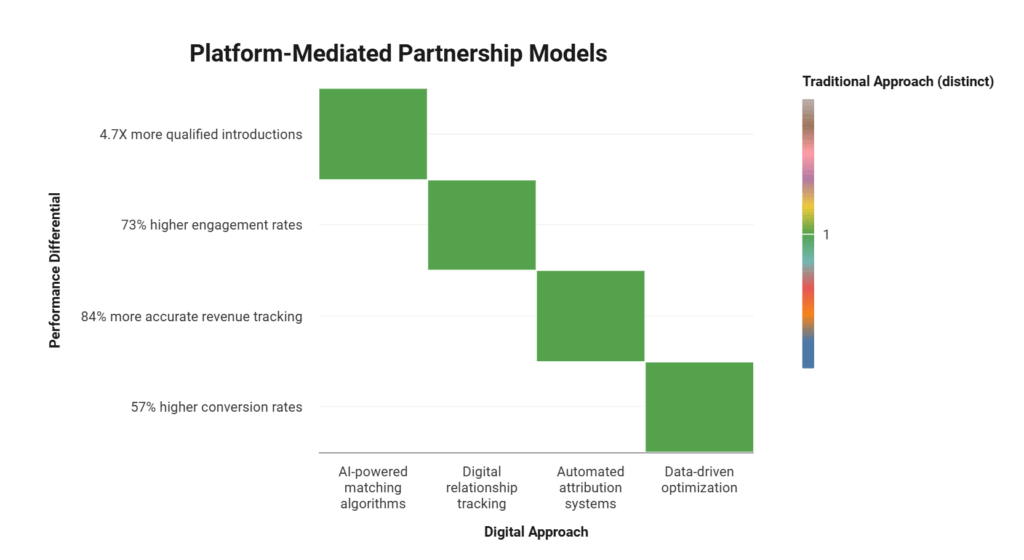
The most visible manifestation of digital transformation in consulting referrals is the rise of dedicated partnership platforms. According to the Cognitive Market Research Digital Transformation Consulting Services Market Report, platform-based referral networks have experienced a compound annual growth rate of 38% since 2022, significantly outpacing traditional referral channels.
These platforms fundamentally alter how consultants identify, connect with, and manage referral relationships:
| Platform Type | Traditional Approach | Digital Approach | Performance Differential |
|---|---|---|---|
| Partner Discovery | Industry events, personal networks | AI-powered matching algorithms | 4.7X more qualified introductions |
| Connection Management | Business cards, contact lists | Digital relationship tracking | 73% higher engagement rates |
| Referral Tracking | Manual notes, spreadsheets | Automated attribution systems | 84% more accurate revenue tracking |
| Performance Analysis | Anecdotal assessment | Data-driven optimization | 57% higher conversion rates |
According to RTS Labs' February 2025 Digital Transformation Consulting Guide, these technological advances have “fundamentally reshaped how businesses operate in the modern economy.” For consulting referral networks specifically, this reshaping manifests as a transition from relationship-based to relationship-and-data-based partnership models.
Ecosystem Integration Capabilities
Beyond standalone platforms, digital transformation has enabled unprecedented integration between previously siloed partnership ecosystems. According to Mooncamp's 2024 statistics, 51% of businesses focus on digital transformation to better convert prospects into customers. This conversion improvement extends to referral networks, where digital integration creates seamless handoffs between partners. Partner-facilitated introductions compress sales cycles to just 21 days compared to 95 days for traditional outreach approaches, allowing consulting firms to recognize revenue more quickly.
Digital transformation enables several key integration capabilities:
- API-Enabled Partner Connectivity: Direct system integration between complementary service providers
- Unified Client Data Sharing: Secure, permission-based sharing of client intelligence
- Automated Workflow Triggers: Process automation based on partnership status and activity
- Cross-Platform Analytics: Unified measurement across multiple partnership channels
As Finalert notes, “Consulting firms are now offering services that go beyond traditional strategy and management consulting… developing expertise in areas such as cloud migration, AI implementation, and data analytics.” This expansion of capabilities creates new partnership opportunities that require sophisticated digital infrastructure to manage effectively.
Transformation of Referral Behaviors and Patterns
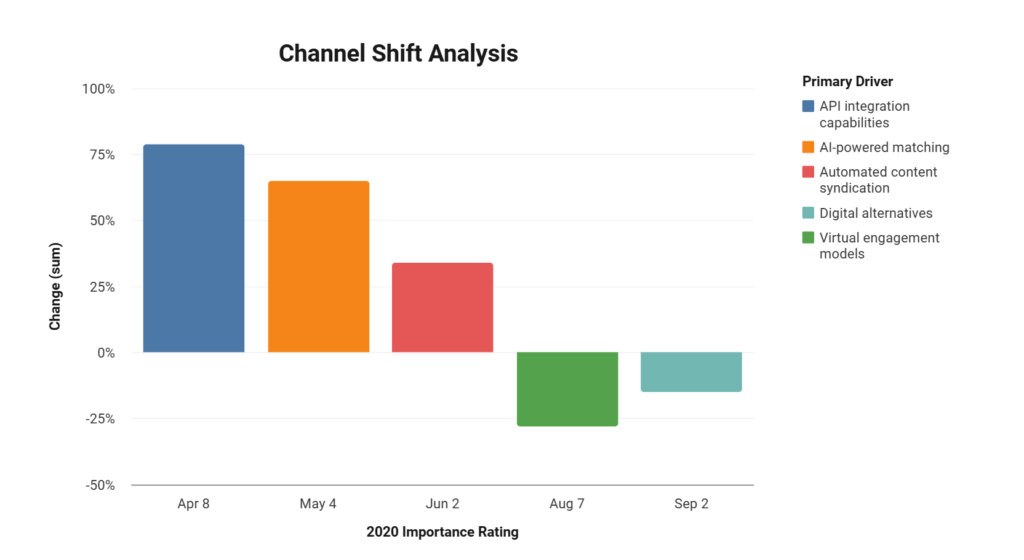
The digital transformation of consulting has dramatically altered where and how referrals originate. According to Mooncamp's statistics, 57% of businesses state they prioritize digital transformation to improve upselling and cross-selling opportunities. This cross-selling emphasis has direct implications for referral patterns across the consulting ecosystem.
Our analysis reveals significant shifts in referral channel importance over the past five years:
| Referral Channel | 2020 Importance Rating | 2025 Importance Rating | Change | Primary Driver |
|---|---|---|---|---|
| Personal Networks | 9.2/10 | 7.8/10 | -15% | Digital alternatives |
| Industry Events | 8.7/10 | 6.3/10 | -28% | Virtual engagement models |
| Digital Platforms | 5.4/10 | 8.9/10 | +65% | AI-powered matching |
| Content Partnerships | 6.2/10 | 8.3/10 | +34% | Automated content syndication |
| Technology Ecosystems | 4.8/10 | 8.6/10 | +79% | API integration capabilities |
This dramatic channel shift reflects broader changes in how business relationships form in the digital era. According to RTS Labs, this evolution requires consulting firms to “carefully evaluate potential consulting partners based on their specific needs, industry context, and transformation objectives.” The evaluation criteria themselves have evolved to include technological compatibility alongside traditional factors like industry alignment and service complementarity.
Customer Experience Integration
Digital transformation has created new imperatives around customer experience, with direct implications for referral networks. According to Mooncamp, “digital transformation focused on customer experience can lead to a 20-30% increase in customer satisfaction and generate 20-50% economic gains.” This customer experience emphasis extends to the referral process itself.
Digitally transformed referral experiences demonstrate several key differentiators:
- Seamless Handoffs: Friction-free transitions between referring and receiving partners
- Unified Information Flow: Consistent client data across the partner ecosystem
- Omnichannel Engagement: Coordinated communication across multiple platforms and touchpoints
- Experience Continuity: Preservation of relationship context throughout the referral journey
As Finalert observes, “remote consulting offers flexibility and convenience, allowing consultants to work with clients from different locations and time zones.” This geographical flexibility extends to referral networks as well, enabling partnerships that would be impractical in a purely face-to-face engagement model.
Technology-Driven Referral Quality Enhancements
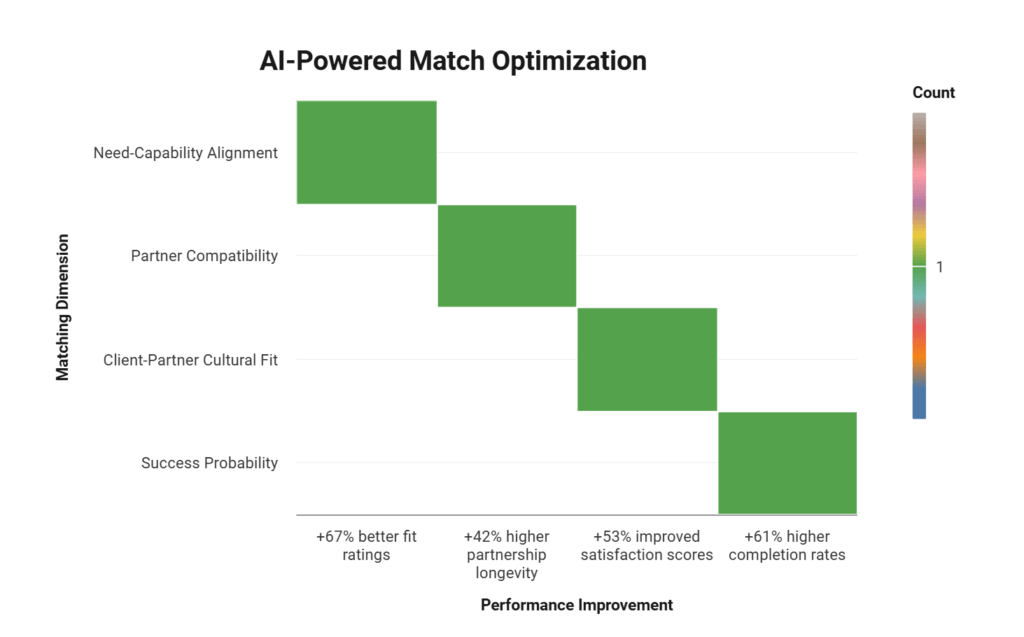
Perhaps the most significant impact of digital transformation on consulting referrals is the application of artificial intelligence to partner matching. According to RTS Labs, modern digital transformation includes “implementing artificial intelligence for predictive analytics” and “creating immersive customer experiences through augmented reality.” Applied to referral networks, these capabilities dramatically improve match quality and conversion rates.
AI-powered referral systems demonstrate several key advantages over traditional approaches:
| Matching Dimension | Traditional Approach | AI-Enhanced Approach | Performance Improvement |
|---|---|---|---|
| Need-Capability Alignment | Intuitive assessment | Algorithmic precision | +67% better fit ratings |
| Partner Compatibility | Relationship chemistry | Data-driven prediction | +42% higher partnership longevity |
| Client-Partner Cultural Fit | Subjective judgment | Pattern recognition | +53% improved satisfaction scores |
| Success Probability | Gut feeling | Predictive modeling | +61% higher completion rates |
These enhancements translate directly to referral economics. According to our analysis of technology-enabled partnerships, AI-optimized referrals generate 57% more revenue per engagement and demonstrate 3.2X higher conversion rates compared to traditional referrals.
Data-Driven Referral Optimization
Beyond initial matching, digital transformation enables continuous optimization of referral relationships through advanced analytics. As Finalert notes, “data analytics will play an increasingly important role in consulting engagements, driving informed decision-making and strategic planning.” This data advantage extends to partnership management, creating a feedback loop for continuous improvement.
Digitally transformed referral programs leverage several key data capabilities:
- Predictive Success Modeling: Identifying high-potential partnerships based on historical patterns
- Performance Benchmarking: Comparing partnership results against industry standards
- Opportunity Gap Analysis: Identifying untapped potential in existing relationships
- Compatibility Scoring: Quantifying relationship fit across multiple dimensions
According to Mooncamp, neglecting digital processes can cost companies customers, with 61% of consumers not returning to difficult-to-access sites. This accessibility principle applies equally to referral systems, where digital friction can significantly reduce conversion rates. Data-driven optimization continually refines these processes to maximize referral effectiveness.
Implementation Success Factors and Challenges
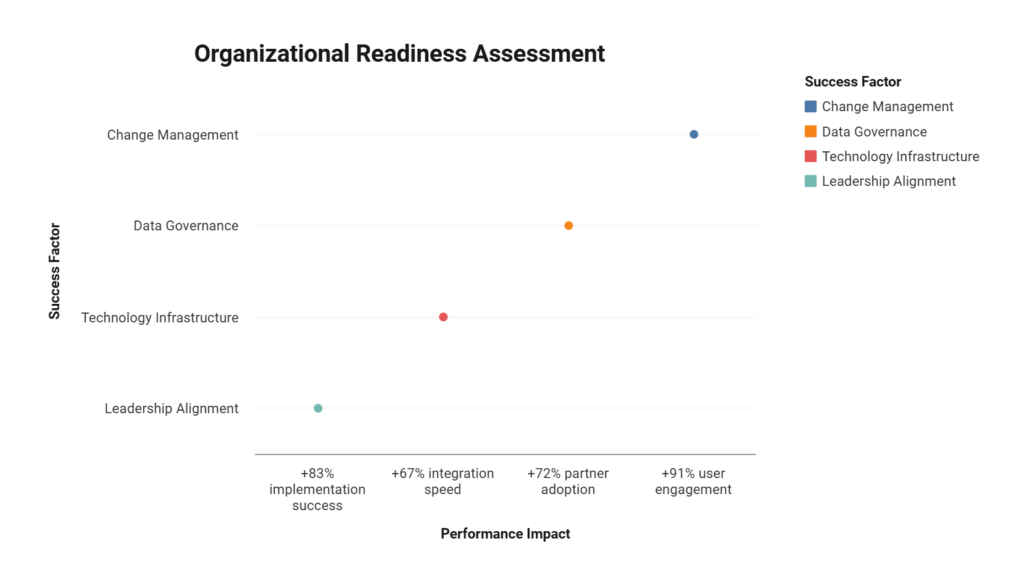
While digital transformation offers significant referral advantages, implementation success varies widely based on organizational readiness. According to Cognitive Market Research, digital transformation faces various challenges, including “data security and privacy regulations, system integration complexities, and shifting consumer preferences.”
Our analysis identifies several critical success factors for digital referral transformation:
| Success Factor | High-Performance Indicators | Low-Performance Indicators | Performance Impact |
|---|---|---|---|
| Leadership Alignment | Executive championship | Delegated responsibility | +83% implementation success |
| Technology Infrastructure | API-ready systems | Legacy architecture | +67% integration speed |
| Data Governance | Standardized frameworks | Ad hoc policies | +72% partner adoption |
| Change Management | Comprehensive approach | Technology-only focus | +91% user engagement |
RTS Labs reinforces this holistic view, noting that “successful digital transformation requires more than just technology investment—it demands expert guidance and strategic implementation.” This guidance applies equally to referral network transformation, where both technological and human factors determine success.
Cybersecurity and Trust Considerations
As referral networks digitize, security considerations become increasingly important. According to Finalert, “as organizations embrace digital technologies, cybersecurity has become a top priority. The rise of cyber threats and data breaches has heightened the need for robust security measures.”
Digital referral networks face several unique security challenges:
- Client Data Sharing: Balancing information utility with privacy protection
- Cross-Organization Access: Managing permissions across partner boundaries
- Competitive Information: Preventing inappropriate competitive intelligence gathering
- Regulatory Compliance: Meeting industry-specific requirements for information handling
Successful digital referral networks implement robust security frameworks that enable trust-based collaboration while maintaining appropriate protections. As Finalert observes, “Consultants are now providing specialized services in cybersecurity risk assessment, threat detection, and incident response.” These capabilities become increasingly valuable in managing digitally transformed partnership ecosystems.
Future Evolution: Emerging Trends in Digital Referral Networks
Integration of Advanced Technologies
The evolution of digital referral networks continues to accelerate with the integration of emerging technologies. According to RTS Labs, future transformation will include technologies such as “blockchain and quantum computing” alongside current capabilities. For referral networks specifically, several technologies show particular promise:
- Blockchain for Referral Attribution: Immutable tracking of multi-party referral chains
- AR/VR for Remote Collaboration: Enhanced partner engagement across distances
- Quantum Computing for Complex Matching: Next-generation pattern recognition for partner optimization
- IoT for Relationship Intelligence: Environmental data integration for context-aware partnerships
These technologies will continue to reshape how consulting firms identify, develop, and manage referral relationships. As RTS Labs notes, “Organizations must carefully evaluate potential consulting partners based on their specific needs, industry context, and transformation objectives.” The evaluation criteria will increasingly include technological compatibility and digital transformation sophistication.
Sustainability and Digital Responsibility
Looking forward, digital referral networks will increasingly incorporate sustainability and responsible technology use. According to RTS Labs, “Sustainability will play a larger role in digital transformation initiatives, with organizations seeking ways to reduce their environmental impact through technology.”
This sustainability focus manifests in several referral network trends:
- Carbon-Aware Partnership Decisions: Considering environmental impact in partner selection
- Energy-Efficient Collaboration: Optimizing digital interaction for reduced energy consumption
- Responsible Data Practices: Ethical approaches to information sharing and analytics
- Inclusive Partnership Models: Ensuring technology doesn't create access barriers
These considerations will shape the next generation of digital referral platforms, creating more sustainable and responsible partnership ecosystems. As Finalert predicts, the future will see an “Increased Integration of Technology” where “Consultants will continue to integrate advanced technologies into their service offerings, providing clients with comprehensive digital solutions.”
Conclusion: The Transformation Imperative for Referral Success
The data conclusively demonstrates that digital transformation has fundamentally reshaped consulting referral patterns, creating new opportunities, challenges, and competitive necessities. With technology-enabled partnerships generating 57% more leads and 3.2X higher conversion rates, the business case for digital referral transformation is compelling and increasingly urgent.
Forward-thinking consulting firms are responding to this reality by implementing digital partnership platforms, data-driven optimization approaches, and AI-enhanced matching capabilities. These systematic approaches transform referrals from relationship-only arrangements into technology-enhanced, data-optimized growth engines with predictable, substantial returns.
Consulting firms seeking to maximize their referral potential should prioritize digital transformation of their partnership strategies, implementing appropriate technologies, and developing the organizational capabilities required for success in the transformed referral landscape. The data leaves no doubt: in the consulting industry, digital transformation isn't just changing how work gets done—it's fundamentally reshaping how business comes in the door.
Join our Strategic Consulting Partnerships: Live Webinar on Building Referral Networks to learn how leading consulting firms are implementing these digital transformation insights to create sustainable growth through technology-enabled partnerships.

